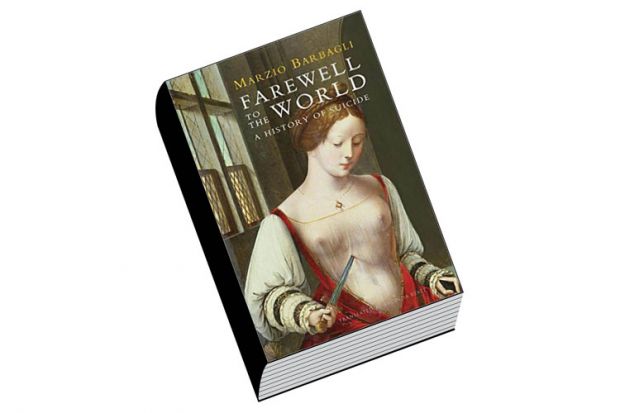Suicide is a fascinating subject; according to Albert Camus, it is “the only philosophical problem”. Marzio Barbagli’s Farewell to the World is a synthesis of epic ambition worthy of Camus’ all-encompassing sentiment. It covers the whole of human history, without geographical limit (although it is divided into “East” and “West”, two of the more problematic umbrella concepts in existence). Consequently, the book cannot help but fall short of its impossible aspirations. Barbagli’s ambition is to be applauded, as books that sit inside tiny academic niches are entertaining only to a very few. However, this rich and multilayered study needs significantly more definition and argumentation.
Barbagli builds on the work of Émile Durkheim, the “father of sociology”, in a respectful but critical vein, aiming to update his theories on suicide in light of contemporary trends. His key argument is that “culture” has much more of an impact on suicide than Durkheim believed. Barbagli believes that Durkheim is too concerned with “social structure”, and he seeks to restore “cultural factors” to their rightful place. There is a whiff of the straw man here: how can something as broad and nebulous as culture fail to have an impact on the incidence of suicide?
Unfortunately, nowhere in this book is there a definition of suicide, which seems to be taken for granted. Reflective scholars have long struggled to demarcate suicide precisely from risky behaviour or chronic self-neglect. Is alcoholism, for example, a form of suicide? Is it prompted by unacknowledged suicidal feelings? It may be that these questions are too broad even for a book of this ambition. Therein lies one of the problems of such limitless scope – every omission seems glaring.
Can it really be useful to consider all these deaths together? Much is made of the differences between East and West, but it is confusing to see the same conceptual scheme applied to the practice of sati (the burning of widows on their husbands’ funeral pyres), Hezbollah suicide missions in the 1980s, and the case of Mary Hines in the 1760s, who drowned an infant in order to be put to death, because she knew “the difference betwixt that and self-murder”.
Barbagli acknowledges that “of course no statistics exist” for vast swathes of the deaths that this book considers. Even confining oneself to Europe and the past 200 years, the numbers available “were collected by very different official bodies” for different purposes and under different definitions. Although he considers this fundamental flaw, he argues that official statistics “can (and must) be used”, albeit with caution. It is unclear how numbers collected according to different definitions and through different means can offer valid comparisons.
There are moments of productive provocation: the death of biblical Israelite Samson is described as “not unlike the actions of modern suicide bombers”. There are many vivid examples of the grotesque things done to the bodies of those deemed to have committed suicide, and compelling descriptions of the varied reactions to, and official strictures against, suicide in many different cultures.
This book’s breadth ultimately gets the better of it. Floods of examples rush past pell-mell, in what becomes a desensitising blur of self-accomplished death. There is not enough analytical direction, or an argumentative structure strong enough to master the subject matter that Barbagli has so assiduously and skilfully assembled, which is a great pity.
Chris Millard is Wellcome Trust postdoctoral research fellow in medical humanities, Queen Mary University of London, and author of A History of Self-Harm in Britain (2015).
Farewell to the World: A History of Suicide
By Marzio Barbagli
Polity, 400pp, £60.00 and £19.99
ISBN 9780745662442 and 2459
Published 4 September 2015
Register to continue
Why register?
- Registration is free and only takes a moment
- Once registered, you can read 3 articles a month
- Sign up for our newsletter
Subscribe
Or subscribe for unlimited access to:
- Unlimited access to news, views, insights & reviews
- Digital editions
- Digital access to THE’s university and college rankings analysis
Already registered or a current subscriber?




